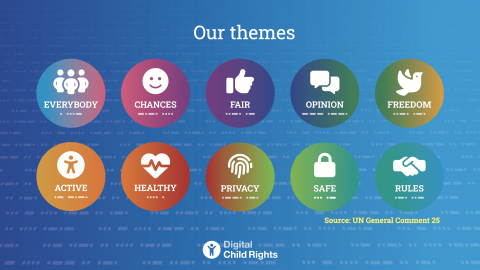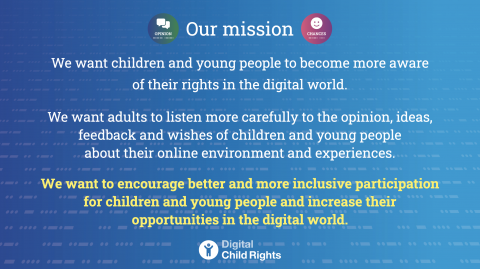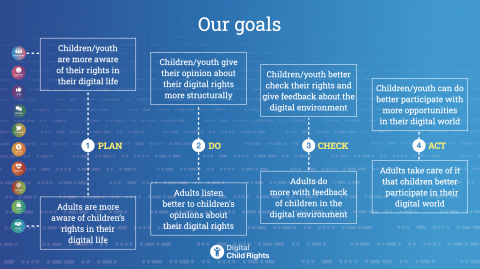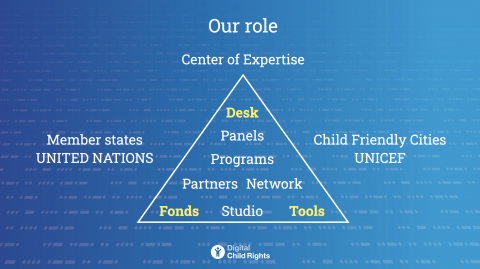Our Digital Child Rights Foundation works on the basis of the Convention on the Rights of the Child and the 'General Comment 25' of the United Nations. This General Comment 25 on children's rights in relation to the digital environment will be adopted by all UN member states in 2021. Based on an extensive substantive analysis, we have selected the following ten themes:
Introducing
the Digital Child Rights Foundation
The Digital Child Rights Foundation works on the basis of the United Nations Convention on the Rights of the Child and the United Nations 'General Comment 25’ about children’s rights in a digital environment. It's important to work on more and better rights for every child in their digital world. An important principle of our foundation is that children and young people have a voice and participate in all our activities. In this short introduction we describe our mission, goals and role.
Working together on digital child-friendly municipalities.
Digital children's rights

Digital child-friendly cities
The online world offers many opportunities for children and young people. That’s why it is important that the digital world is a friendly and safe environment for everyone. It is important that data of children and young people is properly protected. All organizations are obliged to take good care of digital children's rights. Laws and regulations must be complied with. There must also be good plans with sufficient money to be able to work together on digital children's rights.
It is important that proper research is done, so that everyone knows how things are going with digital children's rights. It is also necessary that sufficient and understandable information about rights in the digital world is shared. Not only for children and young people, but also for people who have to take care of children and young people. The digital world should be a friendly place for everyone! All children and young people have rights in the digital world in child-friendly municipalities.
Our challenge
Parents, carers, teachers and professionals are not sufficiently aware of the negative online experiences children have and they do not listen well and structurally to the opinion and feedback of children and young people about improving the digital environment. As UN member states, we therefore do not sufficiently comply with an important part of the General Comment 25 of the United Nations when it comes to:
“Respecting the views of the child
The member state should make children more aware of digital resources to express their opinions and promote access to them, and provide children with training and support to participate on an equal basis with older people, if necessary on an anonymous basis, so that they can participate effectively way to defend their rights, individually and as a group.
In developing legislation, policies, programmes, services and training on children's rights in relation to the digital world, the member state should involve all children and listen to their needs and give due consideration to their views. It should ensure that digital service providers engage actively with children, apply appropriate safeguards and take due account of children's views when developing products and services.
The member state is encouraged to use the digital environment to ask children for their views on relevant legislative, administrative and other measures and to ensure that their views are taken seriously and that children's participation does not result in unnecessary monitoring or data collection that violates their right on privacy, freedom of thought and opinion. It should ensure that consultative processes include children who do not have access to technology or who do not have the skills to use it.”

Our mission
As a foundation, we want to improve and accelerate the structural participation of all children and young people by increasing digital awareness and (cultural) education. We want adults to listen more carefully to the opinions, wishes and feedback of children and young people about their online experiences. We mainly focus on cities and areas where great attention is needed for children's rights in the digital world. We want all children and young people to develop digitally and to have more opportunities through active participation in the digital world.

Our goals
Our goal is to ensure that children and young people participate in the digital world in every phase of our programs. Our activities are aimed at giving them their opinion, wishes and feedback. In every phase we ensure that adults (parents, carers, teachers, professionals, stakeholders, etc.) listen to the voice of children and young people and that they actually do something with it. Ultimately, our goal is to allow all children and young people to participate structurally and to increase their opportunities thanks to the digital world.

Our role
As a center of expertise for digital children's rights, we facilitate inclusive (digital) participation by children and young people in cities through the development of tools for awareness and education. We put children and young people at the center and we give them a voice by developing and managing a Digital Child Rights Panel. We structurally pass on the opinion and feedback of children and young people to parents, carers, teachers, professionals and other important local and national stakeholders. As a center of expertise, we focus on the nearly 200 member states of the United Nations. In each country, we then focus on cities, especially those areas in which children and young people experience a great deal of disadvantage in society. Our aim is to contribute to UNICEF's Child Friendly Cities initiative as a network partner.

The Digital Child Rights Foundation is founded in The Netherlands and is registered at the Dutch chamber of commerce in Amsterdam with number: 88150429.


